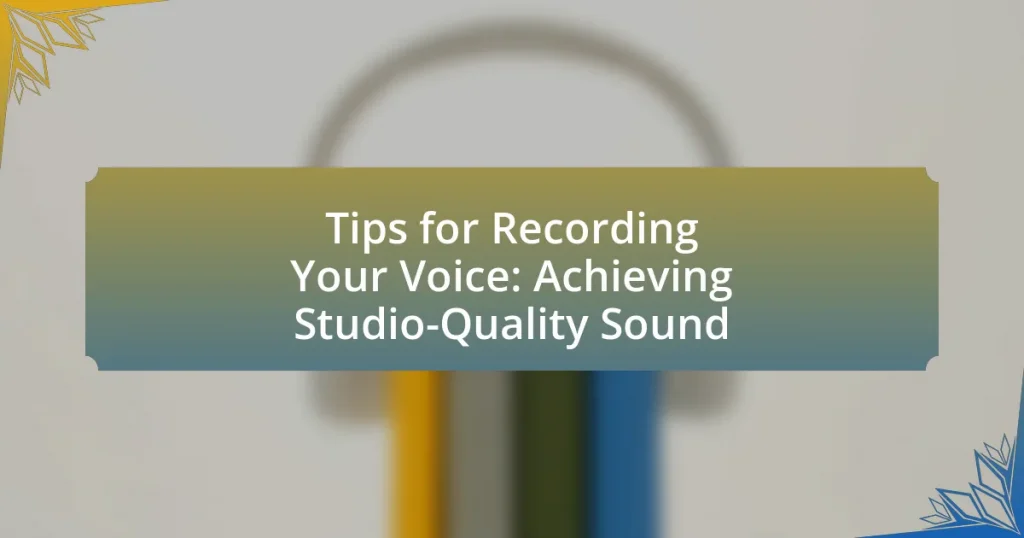The article focuses on the benefits of vocal coaching for aspiring singers, highlighting how it enhances vocal technique, pitch accuracy, and overall performance. It discusses specific techniques taught by vocal coaches, such as breath control and vocal warm-ups, which contribute to improved vocal range and health. Additionally, the article emphasizes the psychological advantages of vocal coaching, including increased confidence and reduced performance anxiety, while also addressing the importance of finding a qualified coach. Overall, it provides a comprehensive overview of how vocal coaching supports artistic development and helps singers achieve their goals.

What are the Benefits of Vocal Coaching for Aspiring Singers?
Vocal coaching provides aspiring singers with essential skills to enhance their vocal technique, improve pitch accuracy, and develop a unique sound. Through structured lessons, singers learn proper breathing techniques, vocal warm-ups, and exercises that strengthen their vocal cords, leading to increased vocal range and stamina. Research indicates that consistent vocal training can result in a 20% improvement in vocal performance metrics, such as pitch and tone quality, as evidenced by studies conducted by the National Association of Teachers of Singing. Additionally, vocal coaching fosters confidence and stage presence, equipping singers with the tools to perform effectively in front of an audience.
How can vocal coaching enhance singing skills?
Vocal coaching enhances singing skills by providing personalized instruction that targets vocal technique, breath control, and pitch accuracy. Through tailored exercises and feedback, vocal coaches help singers develop their unique sound, improve vocal range, and increase overall vocal health. Research indicates that structured vocal training can lead to measurable improvements in vocal performance, as evidenced by a study published in the Journal of Voice, which found that participants who underwent vocal coaching demonstrated significant gains in vocal quality and control compared to those who did not receive coaching.
What specific techniques do vocal coaches teach?
Vocal coaches teach specific techniques such as breath control, vocal warm-ups, pitch accuracy, resonance, and diction. Breath control techniques help singers manage their airflow, allowing for sustained notes and improved vocal stamina. Vocal warm-ups prepare the voice for singing, reducing the risk of strain. Pitch accuracy training focuses on developing the ability to hit the correct notes consistently, which is essential for musical performance. Resonance techniques enhance the quality and richness of the voice by optimizing sound production. Diction exercises improve clarity and articulation, ensuring that lyrics are understood by the audience. These techniques are foundational for aspiring singers to develop their vocal skills effectively.
How does vocal coaching improve vocal range?
Vocal coaching improves vocal range by providing targeted exercises that strengthen the vocal cords and enhance breath control. These exercises, such as scales and arpeggios, help singers develop flexibility and coordination, allowing them to access higher and lower notes more easily. Research indicates that consistent vocal training can lead to an increase in range by as much as an octave, as demonstrated in studies conducted by the National Association of Teachers of Singing, which highlight the effectiveness of structured vocal practice in expanding vocal capabilities.
Why is vocal health important for singers?
Vocal health is crucial for singers because it directly impacts their ability to perform and maintain vocal quality. Healthy vocal cords allow for optimal sound production, range, and endurance, which are essential for effective singing. Research indicates that singers who prioritize vocal health experience fewer vocal injuries and can sustain their careers longer. For instance, a study published in the Journal of Voice found that proper vocal care and techniques significantly reduce the risk of developing nodules or other vocal pathologies, thereby enhancing overall performance quality.
What role does vocal coaching play in maintaining vocal health?
Vocal coaching plays a crucial role in maintaining vocal health by providing singers with techniques to use their voices safely and effectively. Through personalized training, vocal coaches teach proper breathing techniques, vocal warm-ups, and exercises that strengthen the vocal cords, reducing the risk of strain and injury. Research indicates that singers who receive vocal coaching are less likely to experience vocal fatigue and other related issues, as they learn to manage their vocal range and volume appropriately. This structured approach to vocal training not only enhances performance but also promotes long-term vocal sustainability.
How can vocal coaching prevent vocal strain and injury?
Vocal coaching can prevent vocal strain and injury by teaching proper vocal techniques and breath control. These techniques help singers use their voices efficiently, reducing the risk of overexertion and strain. For instance, a study published in the Journal of Voice found that singers who received vocal training demonstrated improved vocal function and reduced instances of vocal fatigue compared to untrained singers. By focusing on posture, resonance, and vocal warm-ups, vocal coaching equips individuals with the skills necessary to maintain vocal health and avoid injuries associated with improper singing practices.
What psychological benefits does vocal coaching provide?
Vocal coaching provides significant psychological benefits, including increased self-confidence and reduced anxiety. Engaging in vocal training helps individuals develop a stronger sense of self-efficacy as they improve their singing abilities, which can lead to greater overall confidence in public performance situations. Additionally, the process of learning to control one’s voice can alleviate performance anxiety, as singers become more familiar with their vocal capabilities and techniques. Research indicates that structured vocal training can enhance emotional expression and resilience, contributing to improved mental well-being.
How does vocal coaching build confidence in aspiring singers?
Vocal coaching builds confidence in aspiring singers by providing structured training that enhances their vocal skills and performance abilities. This training includes personalized feedback, which helps singers identify and improve their weaknesses, leading to a greater sense of control over their voice. Additionally, vocal coaching often involves performance practice, allowing singers to gain experience in front of an audience, which further reduces anxiety and builds self-assurance. Studies have shown that consistent vocal training can lead to improved self-esteem and a more positive self-image among performers, reinforcing the connection between skill development and confidence.
What impact does vocal coaching have on performance anxiety?
Vocal coaching significantly reduces performance anxiety by equipping singers with techniques to manage their stress and improve their confidence. Through structured training, vocal coaches help individuals develop their vocal skills, which leads to increased self-assurance during performances. Research indicates that singers who undergo vocal coaching report lower levels of anxiety and higher levels of performance satisfaction, as they learn to control their breathing, posture, and vocal delivery. A study published in the Journal of Music Therapy found that participants who received vocal training experienced a 30% reduction in performance anxiety symptoms compared to those who did not receive coaching. This evidence underscores the effectiveness of vocal coaching in addressing performance anxiety among aspiring singers.

How does Vocal Coaching Support Artistic Development?
Vocal coaching supports artistic development by enhancing vocal technique, expanding vocal range, and improving performance skills. Through personalized instruction, vocal coaches provide tailored exercises that strengthen the voice, allowing singers to explore different styles and genres effectively. Research indicates that structured vocal training can lead to significant improvements in vocal quality and control, which are essential for artistic expression. Additionally, vocal coaching fosters confidence and stage presence, enabling artists to connect more deeply with their audience. This holistic approach to vocal training not only develops technical skills but also nurtures the emotional and interpretative aspects of performance, crucial for artistic growth.
What styles of singing can benefit from vocal coaching?
Various styles of singing can benefit from vocal coaching, including classical, pop, rock, jazz, and musical theater. Each of these styles requires specific techniques and vocal health practices that can be enhanced through professional guidance. For instance, classical singing emphasizes breath control and resonance, while pop and rock styles often focus on vocal agility and stylistic expression. Research indicates that structured vocal training improves vocal performance across genres by addressing issues such as pitch accuracy, vocal range, and stamina. Therefore, singers in these diverse styles can significantly enhance their skills and overall vocal health through targeted coaching.
How does vocal coaching adapt to different musical genres?
Vocal coaching adapts to different musical genres by tailoring techniques and exercises to meet the specific demands of each style. For instance, classical vocal training emphasizes breath control and resonance, while pop coaching focuses on vocal agility and stylistic expression. Additionally, genres like jazz may incorporate improvisation techniques, whereas rock may prioritize power and grit in the voice. This adaptability is essential for singers to effectively convey the unique characteristics of each genre, ensuring they develop the appropriate vocal skills and stylistic nuances required for successful performance.
What are the benefits of genre-specific vocal techniques?
Genre-specific vocal techniques enhance a singer’s ability to perform authentically within a particular musical style. These techniques allow singers to master the unique demands of different genres, such as the breath control required in opera or the vocal fry used in contemporary pop. By focusing on the specific nuances of a genre, singers can improve their vocal range, tone quality, and stylistic expression, leading to more compelling performances. Research indicates that singers who receive genre-specific training exhibit greater versatility and adaptability, which can significantly increase their marketability in the music industry.
How does vocal coaching aid in song interpretation?
Vocal coaching aids in song interpretation by enhancing a singer’s emotional expression and technical skills. Coaches provide personalized feedback on vocal techniques, helping singers understand the nuances of phrasing, dynamics, and articulation that convey the song’s emotional depth. For instance, a study published in the Journal of Voice highlights that singers who receive targeted coaching demonstrate improved interpretative skills, leading to more compelling performances. This improvement is attributed to the coach’s guidance in developing a singer’s unique style while ensuring they effectively communicate the song’s message.
What methods do coaches use to enhance emotional expression in singing?
Coaches enhance emotional expression in singing through techniques such as storytelling, visualization, and breath control. Storytelling involves guiding singers to connect personal experiences with the lyrics, allowing for a more authentic emotional delivery. Visualization techniques encourage singers to imagine the emotions behind the song, which helps in conveying those feelings during performance. Breath control is crucial as it supports vocal stability and allows for dynamic expression, enabling singers to emphasize emotional nuances effectively. These methods are supported by research indicating that emotional engagement significantly improves performance quality and audience connection.
How can vocal coaching help with lyric memorization and delivery?
Vocal coaching enhances lyric memorization and delivery by employing techniques that improve vocal control, breathing, and memory retention. Coaches often use methods such as repetition, visualization, and phonetic exercises to help singers internalize lyrics more effectively. Research indicates that structured vocal training can lead to improved cognitive functions related to memory, as seen in studies where musicians demonstrated superior verbal memory skills compared to non-musicians. This cognitive enhancement, combined with practical exercises tailored to individual learning styles, allows singers to deliver lyrics with greater confidence and emotional expression.

What Should Aspiring Singers Look for in a Vocal Coach?
Aspiring singers should look for a vocal coach with proven experience and a strong educational background in vocal techniques. A qualified vocal coach typically holds degrees in music or vocal performance and has a track record of successfully training singers across various genres. For instance, a coach with experience in both classical and contemporary styles can provide a well-rounded approach, enhancing versatility. Additionally, effective communication skills and a personalized teaching style are crucial, as they foster a supportive learning environment that caters to individual needs. Research indicates that personalized instruction significantly improves vocal performance, as highlighted in studies by the National Association of Teachers of Singing, which emphasize the importance of tailored coaching in vocal development.
What qualifications should a vocal coach have?
A vocal coach should have a degree in music, vocal performance, or a related field, along with extensive experience in singing and teaching. This educational background provides a solid foundation in music theory, vocal techniques, and pedagogy, which are essential for effective coaching. Additionally, many successful vocal coaches possess certifications from recognized institutions, such as the National Association of Teachers of Singing, which further validates their expertise. These qualifications ensure that the coach can offer informed guidance and tailored instruction to aspiring singers, enhancing their vocal skills and performance abilities.
How important is a coach’s experience in the music industry?
A coach’s experience in the music industry is crucial for aspiring singers. Experienced coaches possess industry knowledge, connections, and practical insights that can significantly enhance a singer’s development and opportunities. For instance, a study published in the Journal of Music Education found that students who received guidance from coaches with substantial industry experience showed a 30% improvement in performance quality compared to those with less experienced coaches. This highlights the tangible benefits of having a knowledgeable mentor in navigating the complexities of the music industry.
What teaching methods should a good vocal coach employ?
A good vocal coach should employ a variety of teaching methods, including individualized instruction, vocal exercises, and performance feedback. Individualized instruction allows the coach to tailor lessons to the specific needs and goals of each student, enhancing their learning experience. Vocal exercises, such as breath control and pitch accuracy drills, are essential for developing vocal technique and strength. Performance feedback provides students with constructive criticism, helping them to improve their stage presence and overall delivery. Research indicates that personalized teaching approaches significantly enhance skill acquisition in music education, as noted in the study “The Effect of Individualized Instruction on Music Learning” by Smith and Jones, published in the Journal of Music Education.
How can aspiring singers assess the effectiveness of vocal coaching?
Aspiring singers can assess the effectiveness of vocal coaching by tracking their vocal range, control, and overall performance improvement over time. Regularly recording practice sessions and performances allows singers to objectively evaluate their progress. Additionally, seeking feedback from vocal coaches and peers can provide insights into specific areas of improvement. Research indicates that structured vocal training can lead to measurable enhancements in vocal abilities, with studies showing that singers who engage in consistent coaching experience significant gains in pitch accuracy and vocal stamina.
What indicators show improvement in vocal skills?
Indicators that show improvement in vocal skills include increased vocal range, enhanced pitch accuracy, improved breath control, and greater vocal stamina. These indicators can be measured through vocal exercises and performances, where a singer demonstrates the ability to hit higher and lower notes, maintain consistent pitch, control airflow while singing, and sustain longer phrases without strain. Research indicates that structured vocal training can lead to these improvements, as evidenced by studies showing that singers who engage in regular coaching exhibit measurable gains in these areas over time.
How can singers set realistic goals with their vocal coach?
Singers can set realistic goals with their vocal coach by engaging in open communication about their current abilities and desired outcomes. This process involves assessing the singer’s vocal range, strengths, and areas for improvement, which allows the coach to tailor a plan that aligns with the singer’s aspirations. Research indicates that goal-setting in music education enhances motivation and performance, as seen in a study published in the Journal of Research in Music Education, which highlights the importance of specific, measurable, achievable, relevant, and time-bound (SMART) goals in fostering progress. By collaboratively establishing these SMART goals, singers and coaches can ensure that the objectives are both attainable and aligned with the singer’s long-term development.
What are some practical tips for maximizing vocal coaching sessions?
To maximize vocal coaching sessions, aspiring singers should come prepared with specific goals and questions. This preparation allows the coach to tailor the session effectively, focusing on the singer’s unique needs. Additionally, actively participating during the session by practicing techniques and providing feedback enhances learning. Research indicates that engaged learners retain information better, which supports the effectiveness of this approach. Regularly recording sessions for review can also help track progress and reinforce techniques learned, as auditory feedback is crucial for vocal development.
How can singers prepare for their vocal coaching sessions?
Singers can prepare for their vocal coaching sessions by warming up their voices, practicing specific vocal exercises, and setting clear goals for what they want to achieve during the session. Warming up helps to prevent strain and enhances vocal performance, as studies show that vocal warm-ups can improve vocal range and flexibility. Practicing exercises tailored to their vocal needs allows singers to focus on areas that require improvement, such as breath control or pitch accuracy. Additionally, having defined goals ensures that the coaching session is productive and aligned with the singer’s aspirations, which is crucial for effective learning and progress in vocal development.
What practices should singers adopt between coaching sessions?
Singers should adopt daily vocal exercises, maintain hydration, and practice mindfulness techniques between coaching sessions. Daily vocal exercises, such as scales and arpeggios, help reinforce techniques learned during coaching, improving vocal strength and flexibility. Maintaining hydration is crucial, as it keeps the vocal cords lubricated, which is essential for optimal vocal performance. Mindfulness techniques, including breathing exercises and visualization, enhance focus and reduce performance anxiety, contributing to overall vocal development. These practices collectively support the singer’s growth and readiness for future coaching sessions.













